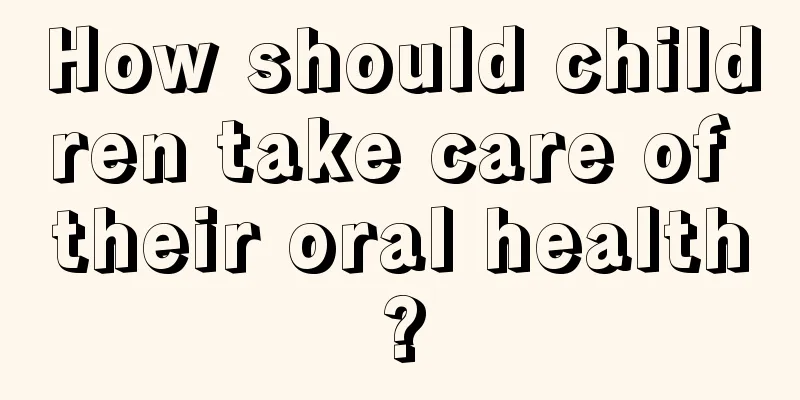How should children take care of their oral health?

|
Children's oral health is very important. It is not only related to the oral development of children, but also directly affects the health of the whole body. Therefore, as parents, we must understand some methods of children's oral health care, such as letting children develop good eating habits, paying attention to oral hygiene, and if the oral condition is not good, they need to go to the hospital for regular oral examinations, etc. 1. Balanced diet During infancy, all deciduous teeth and most permanent teeth are formed and calcified, and it is also a period of rapid growth and development of the body. Therefore, ensuring adequate supply of protein, vitamins and foods rich in inorganic substances such as calcium, iron, phosphorus, etc. is beneficial to the normal development of teeth. Before 5-6 months, all nutrition should be obtained from breast milk or formula. After 5-6 months, it is recommended to add iron-rich dry cereals, provide appropriate snacks (such as fruits), sugar-free cereals, unsalted crackers and cheese. On the one hand, it meets the baby's growth and development needs, and on the other hand, it cultivates the baby's chewing ability and prepares for the transition to weaning. 2. Promote breastfeeding Breast milk is the best natural food for babies. It is high in calories, rich in various nutrients needed by babies, and contains more enzymes and antibodies, which are beneficial to babies' digestion, absorption and disease resistance. Direct breastfeeding is convenient, hygienic and economical. Therefore, exclusive breastfeeding for at least 6 months is recommended. Pay attention to the feeding posture when breastfeeding. It is best to feed the baby while sitting and holding the baby, and feed alternately from left to right to avoid affecting the growth and development of the baby's maxillofacial area. Although breastfeeding on demand until the age of 2 is recommended from the perspective of maternal and child health, from the perspective of oral health, very long-term breastfeeding will increase the risk of caries. Therefore, regular feeding on demand should be advocated. 3. Artificial feeding precautions The feeding bottle is a tool for artificial feeding. When bottle-feeding, you should choose a nipple that is suitable for the baby's age to avoid a hole that is too large so that the milk flows out too quickly and the chewing muscles do not get the proper exercise they need. When feeding, you should hold the baby while feeding, avoid letting the child drink milk while lying down, and do not press the bottle against the upper front teeth to avoid affecting maxillofacial development. Infants and young children should not be given a bottle of milk or other sweetened beverage as a placebo at any time, especially during naps and sleep. Also, pay attention to the contents of the bottle, which should contain only water and milk. 4. Limit intake of sugary drinks and foods Carbohydrates are the source of energy for the human body and are one of the essential nutrients for growth and development. But the problem with refined carbohydrates is that the sugars in them are related to the occurrence of tooth decay. Parents should limit the intake of sugary drinks and foods, and reduce the amount and frequency of sugar consumption. After children are 1 year old, try to give only water or unsweetened milk between meals. Natural fruit juice is high in sugar, so try to give it to your children from a cup. If children can eat fruit directly, they should do so to minimize damage to their teeth. 5. Don’t pass germs to your child through word of mouth The saliva in the mouth is a carrier of bacteria. The person who feeds the child can spread the pathogenic bacteria in the mouth to the child through kissing, feeding the child with his or her own chopsticks, chewing the food and feeding it to the child, putting the food in his or her own mouth to test the temperature, etc. The earlier the caries-causing bacteria are transmitted to the child, the more likely the child is to develop caries early. Therefore, caregivers should maintain good oral hygiene, correct poor feeding practices, and avoid spreading pathogens to infants and young children. |
<<: What are the symptoms of urticaria in children?
>>: How to care for children with facial paralysis? These 3 points must be achieved!
Recommend
Seven truths about baby fever
1. Fever starts at 38 degrees Celsius When the ba...
Baby's nose is humming but there is no snot
It is not easy for anyone to grow up from childho...
There are four symptoms of spastic cerebral palsy in children
Spastic cerebral palsy is a relatively common ped...
What is the best treatment for tonsillitis in children?
Tonsillitis is a common disease and one of the mo...
What should I do if my 11-year-old child is constipated?
Since children generally have weaker resistance a...
One year old baby can't stand
Many parents become very anxious when they find t...
Treatment of severe neonatal asphyxia
We may know that there are many reasons for sever...
What to do if a child has blisters caused by burns
If burns are not treated correctly, normal treatm...
What should I do if my baby spits up milk in a projectile manner?
Many babies will spit up milk when feeding, but t...
Nursing of acute conjunctivitis in children
Eyes are the windows to our soul, but in spring a...
What's wrong with children's blue eyes? These are the main reasons
Parents will be particularly worried when their c...
What should I do if my child’s eyes are bloodshot after being hit by a hard object?
Children's skin is relatively delicate and th...
How to treat children's autumn diarrhea
Both adults and children will suffer from diarrhe...
Symptoms and diagnosis of mesenteric lymphadenopathy in children
Do you know what is the cause of children's m...
What to do if your baby has indigestion before one month old
If a baby under one month old suffers from indige...









